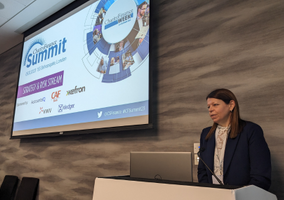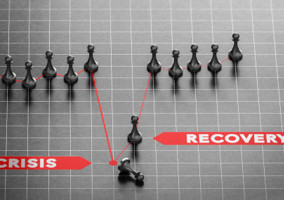October’s Charity Finance Summit demonstrated the best of our sector. Charity leaders who, having delivered essential services throughout a period of increased demand for their services and growing competition for funding, were proactive and engaged with considering ways to ensure their organisation remains resilient and ready for the future.
Recent years have highlighted the importance of doing so. With funders pausing applications, several charity mergers announced, and local and national charities making the impossible decision to close, it seems that the challenges facing the sector are set to continue.
Charities Aid Foundation (CAF) research found over half (54%) of charities report that demand for their services had increased significantly over the last 12 months, up from 46% in 2023. This is coupled with growing competition for funding and donations, which many charities cited as their primary challenge (50%), followed closely by concerns around financial sustainability because of lower public sector funding and fewer donations (45%).
Those who work in the charity sector are some of the most resilient, skilled and dedicated people I know. But operating under such conditions has left little opportunity for many charities and their leaders to take an overall look at the sustainability of their organisation and plan for the longer term.
As we begin to emerge from this difficult period, hopefully into calmer waters, taking the time to assess and build your charity’s resilience, can help to make sure you are prepared for what comes next.
Maintaining clarity of purpose
Charities need to be both prepared for uncertainty and adaptable. But where do you start? Ensuring your organisation has a clear purpose should be at the top of a charity leader and trustee’s to-do list.
Ask yourself who your organisation wants to support, what success looks like, and where your organisation should be in the years ahead. This will help to prioritise activities and identify the proactive steps to take to strengthen your organisation’s financial resilience.
Utilising technology to build financial resilience
Technology can be a vital tool for charities to harness for their future. But the Charity Digital Skills Report 2024 found that 41% of all charities admit to being “poor” at digital fundraising, with a further 25% not doing any at all.
Consider whether your charity could use AI-based tools to help with grant-writing, or to speed up administrative tasks. There are several free digital tools now, and many providers offer discounts to charities.
By not engaging with technology, you could be missing opportunities on funding operations and improving service delivery. The potential lost income and higher costs in not gripping technology and developing these skills is likely to make the task of fulfilling your purpose more difficult.
Enhancing donor engagement
Maximising income is clearly crucial for any charity to ensure it can deliver on its purpose. Revisiting your approach to attract support from a growing, diverse range of potential donors can pay dividends in the longer term.
Can you target millennial and Gen-Z donors who have grown up as digital natives, through online platforms? Demonstrating impact from donations on the platforms they use can help to raise awareness of your work and contribute to long-lasting relationships.
Are you engaging with donors in your local area? We know that people often feel a strong connection to a place where they live, or have lived, and want to support organisations in their communities. It can also be worth exploring whether your organisation might also be eligible for social investment or a loan to help you grow.
While securing a corporate partner can be a boon for a charity, leaders should remember that their charity expertise can be extremely valuable to businesses.
Throughout CAF’s work with charities and corporates, the best partnerships are built on co-operation. Finding common ground with a business, and articulating a donation in terms of impact, or as an investment, could help a corporate to engage staff and deliver on their community investment and their ESG strategy.
Long-term financial planning
Key to building financial resilience is considering whether your organisation has the right investment and savings strategy in place for your circumstances which also supports your goals.
Long-term deposit products are currently providing charities with access to highly competitive rates, many above 4%, so these may be more suitable than other arrangements for your reserves. One charity we work with increased their returns from £200 a month to over £1,800 in this way.
Investing can also be an option to support your long-term goals. CAF Bank’s Guide to Investments provides a summary of the options available to charities, including the potential benefits of ESG funds, that could provide sustainable financial returns in line with your values.
Undertaking a thorough evaluation of goals and financial circumstances while continuing to deliver every day is no easy task. But the last few years have taught us to expect the unexpected and therefore, building long-term resilience needs should be under continuous review.
Through embracing new technology, refreshing donor strategies, and exploring the potential of financial products, charity leaders can make informed strategic decisions that will enable them to meet increased demand and ensure they continue to deliver their essential role in society in the years ahead.












